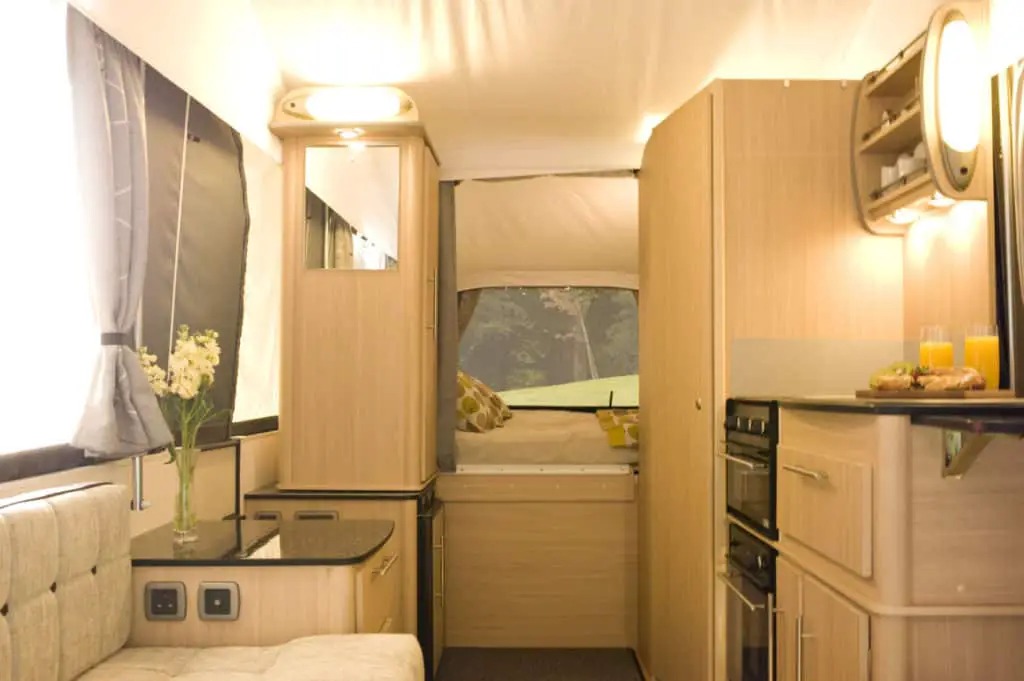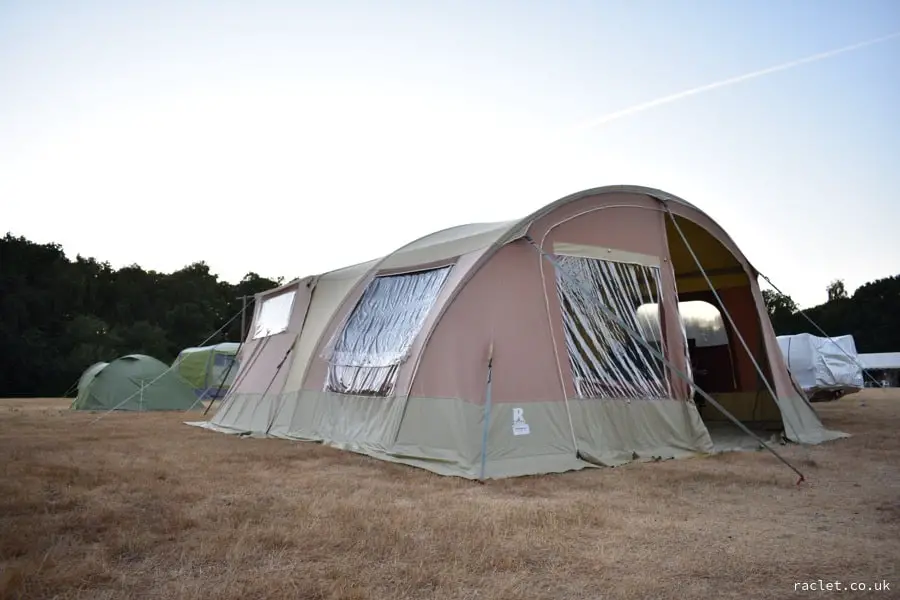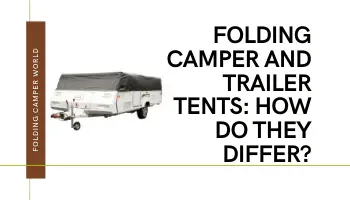To casual observers, trailer tents and folding campers are pretty similar in appearance. However, speak to trailer tent and folding camper owners separately, and both will reel off a long list about how the two differ. Alas, there are similarities between the two, but there are also some distinct differences.
What is the difference between a folding camper and a trailer tent? There are several key differences between a folding camper and a trailer tent. Firstly, everything is contained within the body of the folding camper, whereas your cooking equipment and so on in a trailer tent will all be stored in the awning. Secondly, trailer tents require pegging, whereas folding campers don’t on the main unit.
The two above differences are just two main ways that the two differ. I’m going to explain some of the other differences, as well as which is best in my opinion.
How Folding Camper And Trailer Tents Differ
Although I give you an idea of how the two differ above, there are plenty more differences than I was able to mention before. Here are several of the key differences that you need to be aware of because they will impact whether a folding camper or trailer tent is best for you.
A trailer tent is essentially a trailer in a tent – which you might have guessed from the name! Once you open the trailer tent, you pitch it in the same way that you would with any other type of tent. You peg it into the ground, which is one of the most laborious tasks I can think of! This alone can often be very offputting for anyone looking at both trailer tents and folding campers because the main unit of the folding camper doesn’t peg into the ground.

A trailer tent often simply contains a bed or two, a little seating and a tiny bit of storage. That means you rely almost entirely on the awning for sleeping space. A folding camper is more relatable to a caravan in this respect. The main unit contains everything that you need (a kitchen, storage, sometimes a toilet) meaning that you won’t have to use awning if you don’t want to.
Another key difference is how long it takes to put the two up. For most people, it takes around 20 minutes to put a folding camper up. You simply open it out and arrange the inside correctly, which is easy, to say the least (this doesn’t include putting up the awning, which can take a lot longer). Putting up a trailer tent takes around 1 hour. This is primarily due to the time that it takes to peg the trailer tent into the ground. Please note that some newer trailer tents, such as a Camp-let, have non-pegging bodies.

Folding campers are accepted in most locations across the UK and Europe, whereas trailer tents are accepted in fewer locations when camping. This is because folding campers are usually considered a folding caravan since they don’t need pegging into the ground. Trailer tents can only really be used at venues that allow tents because they can’t be used on a caravan plot in the same way that folding campers can.
We’ve now covered all the main differences between folding campers and trailer tents. Which one is right for you? I’m going to explain the benefits of both so you have all the information that you need to make an informed decision.
Folding Camper or Trailer Tent: Which Is Best?
No one can answer whether a folding camper or trailer tent is best because it’s completely subjective. However, there are several advantages of each, which should help you to make your decision about which is best for you. Here are the main folding camper benefits:
- Everything you need in one unit (kitchen, toilet, et cetera)
- Acceptable on most campsites (even caravan-only sites)
- Plenty of storage
Here are the main trailer tent benefits:
- Cheaper than folding campers and caravans
- Lighter than folding campers and caravans
- Relatively easy to store
Now I’ll further detail all the advantages I’ve mentioned above, so you can see which is best for you!
Folding Camper Benefits
First and foremost, a benefit of a folding camper is that you have everything you need in one unit.
If you fancy a weekend away, you don’t want to be spending hours putting up the awning. If you had a trailer tent, that’s what you’d have to do considering most of them don’t contain a kitchen or any relaxing space. With a folding camper, you have everything you need in the one unit.
Most 6 berth folding campers contain a kitchen, a spacious area for sitting and relaxing, and a canvas toilet. Folding campers have water, gas, and electric systems too, meaning you have literally everything you need to comfortably go away for the weekend.
Secondly, folding campers are often accepted on most campsites. In fact, they are often accepted on campsites that are ‘caravan-only’.
As I mentioned earlier in this blog post, folding campers are often considered folding caravans as they don’t peg into the ground. This means they can be erected on caravan plots without any trouble. They also have water, electric, and gas systems, which is perfect for caravan sites where communal facilities might not be available.
You can only use trailer tents at a limited number of campsites. You can use a trailer tent virtually everywhere that you can use a normal tent, so there’s plenty of places to stop across the UK and Europe. However, your choice is limited compared to the variety available to you when stopping in a folding camper.
Last but not least, folding campers have plenty of storage space available, especially the larger 4- and 6-berth models. Perfect for families enjoying camping breaks!
One of the worst things about the classic camping experience with your average tent is the lack of storage. Depending on the vehicle you’re travelling in, the tent can end up taking up a lot of space. This leaves little space for everything else you want to take camping with you! While trailer tents naturally have some storage, folding campers have far more.
I store a lot in my folding camper trailer before travelling, such as some electronics, food, and all the additional equipment we’re taking. This leaves plenty of room for everything else we want to take in the car, such as board games and so on that we wouldn’t be able to take otherwise.
Trailer Tent Benefits
Firstly, trailer tents are typically cheaper than both folding campers and caravans.
Folding campers can cost thousands of pounds brand new. For example, the latest Pennine Fiesta costs £13695. That’s one of the smaller in Pennine’s range, too. Even second hand folding campers can be really expensive because they hold their value very well. On the other hand, a brand new Raclet Solena costs £5110. The difference in price is significant, which undoubtedly massively impacts which you choose.
Secondly, trailer tents are lighter than folding campers.
As I mentioned in an article I previously wrote, the average weight of a folding camper is 600kg. Most folding campers fall into the 600kg – 1,000kg bracket. This is a fairly significant weight to tow, particularly if you’re an inexperienced tower or you don’t enjoy towing trailers.
Trailer tents, for the most part, are much lighter than folding campers. As stated by Camperlands, trailer tent weights vary from under 150kg up to around 500kg. Evidently, any trailer tent falling into this bracket is much lighter than most folding campers. The lower weight means towing is easier, especially for beginners, and moving the trailer tent around onsite is less of a challenge than moving a folding camper.
Thirdly, trailer tents are usually much easier to store than folding campers.
Folding campers are pretty large, especially if you have a larger model, such as a Pennine Pathfinder or a Conway Crusader. For example, the width of a Conway Crusader is 212cm and the height is 139cm. This is much bigger than the Raclet Solena, which is 145cm wide and 92cm high.
If you have limited storage at home, a trailer tent may be the best option for you. If you’ll have to pay for storage regardless of whether you choose a trailer tent or a folding camper, it will be cheaper to store the smaller of the two. If you’ll only travel during the summer months, the storage costs of a folding camper can end up being much more expensive than storing a trailer tent.
Whether a trailer tent or a folding camper is best for you can depend on several factors, as you’ve probably realised reading this blog post. I prefer folding campers, primarily because I have everything I need in one unit and my family and I can comfortably stay in one. However, a trailer tent might be better for you, depending on your personal situation and requirements. Regardless of which you think is best, I hope my blog post helps you to make an informed decision when purchasing one or the other.


